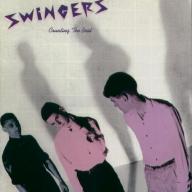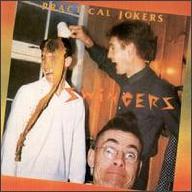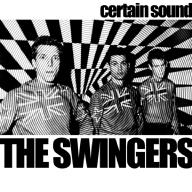Obviously inspired by the punk movement, Judd left behind all of the art excesses he had become know for in Split Enz and formed Swingers in late 1978, a no-frills, no-image, straightforward power trio, with Dwayne Bones Hillman (bass) and Buster Stiggs (drums) -- both formerly of Suburban Reptiles. After five months of constant rehearsals without gigs, the band made their live debut with an opening spot for Split Enz. Afterward, they switched to smaller venues as headliners, where they built a strong following throughout 1979. In April of 1980, they recorded a single for Ripper Records, One Good Reason -- the single eventually broke the New Zealand Top 40. The band set off for Australia on an opening slot for the Sports. While in Australia, they teamed up with David Tickle (who had just finished working with Split Enz) to re-record One Good Reason as well as the infectious Counting the Beat. Judd and Stiggs had a falling out when Judd decided to take a stronger leadership of the band (previously the band was a democracy with all songwriting credited to Swingers). Stiggs left to join the Models in December of 1980 and was replaced by Ian Killjoy Gillroy. The new recording of Counting the Beat was an instant smash in Australia, hitting number one in February of 1981. The follow-up, It Ain't What You Dance, failed to chart though. In July, the band recorded several songs for the soundtrack to the film #Starstruck (Judd would also write additional incidental music and the band made several appearances in the film). The following month, their full-length debut, Practical Jokers, was released by Mushroom Records. Resequenced and edited, the album saw an American release under the title Counting the Beat in 1982 on Backstreet Records. The title track, It Ain't What You Dance, and the newly added single, One Good Reason (Gimme Love), seemed to fit perfectly into the new wave and found a fair amount of exposure on the then-infant MTV. #Starstruck also found a cult following in the U.S., giving the band a real chance for a breakthrough in the States, but momentum was running out for the band. Their Australian following was dwindling and, in response, they added a new frontman, Andrew McLennan, formerly of Pop Mechanix. The new lineup released one single, the wonderfully catchy Punch and Judy, in early 1982. The single failed, and Judd dissolved the unit in May the same year to pursue a solo career.
Hillman later found success as a member of Midnight Oil. Judd released one poorly received solo album (1983's Private Lives) and two more with ex-Split Enz bandmates as Schnell Fenster; he kept a low profile through the '90s, dividing his time between artistic pursuits and composing music for films, but returned with a solo album in 2006. ~ Chris Woodstra, Rovi















